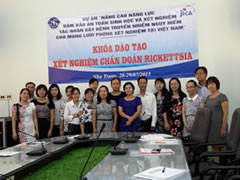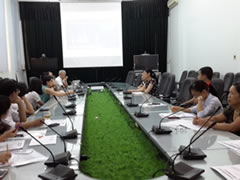- Home
- Technical Cooperation Projects
- Index of Countries
- Asia
- Viet Nam
- The Project for capacity development for laboratory network in Vietnam of biosafety and examination of highly hazardous infectious pathogen
- Project News
- Training course on laboratory diagnosis of Rickettsiosis in Central region
Project News
2015-08-12
Training course on laboratory diagnosis of Rickettsiosis in Central region
Rickettsiosisrepresents 3 main clinical symptoms such as fever, rash and systemic malaise after transmitted by vectors such as infected trombiculid mites in scrub typhus. Rickettsial infections are suspected to account for main part of unknown fever diseases in the Southeast Asia including Vietnamby judging from the distribution of vectors mediating these infectious diseases. Only limited typical cases can be counted in the current situation of Vietnam since Rickettsiosis has been so fardiagnosed solely depending on clinical symptoms of patients with fever, rash and systemic malaise without evidence based on laboratory testing. Laboratory diagnosisof Rickettsiosis has not yet been established due to lack of standard protocols employed in Vietnam. Consequently, information on the occurrence and numbers of patients has been so far indefinite since most of cases representing atypical symptoms have been interpreted as the numbers of patients with fever of unknown cause. Although antimicrobiotics such as tetracyclin series have excellent therapeutic effect on Rickettsiosis, delay of treatment often results in sever condition of patients with sometime death. Therefore the introduction of good microbiological technique on laboratory diagnosis might make it possible to timely treat patients and prevent such sever cases of patients from often taking place in Vietnam.
To strengthen the capacity of laboratory diagnosis on Rickettsia in the central region where Rickettsial infections often take place, the second training course was co-organized in Pasteur Institute of NhaTrang (PINT) from 27 to 29 July under the instruction of a short-term expert, Dr. Kozue MIURA (Laboratory of Veterinary Public Health, Department of Veterinary Medical Science, Graduate School of Agricultural and Life Science, the University of Tokyo, Japan), Vice-Director Mai, Drs. Khanh Hang and Thu Hang, NIHE. Participants attending this training course were 9 staff: 3 from PINT, 2 from TIHE and 2 as observers from Institute of Malariology, Parasitology and Entomology, HCMC. The training course included lectures and practice covering several aspects such as culture isolation method as basic laboratory diagnosis of Rickettsiosis, and PCR diagnosis methods according to SOP of NIHE. The training course was organized with special focus on detection of pathogens from Vietnamese patients by PCR employing a stable and safer positive control, which is plasmid inserted with genetic fragment of pathogens without need of BSL3. It is important to isolate pathogens from Vietnamese patients as standard strains in order to establish laboratory network of Rickettsiosis in Vietnam. Establishment of the standard SOP might pave the wayto clearly diagnose these so-far indefinite Rickettsial infections in Vietnam with reduction in the numbers of patient's death in near future.
 All participants of training course
All participants of training course
 Discussion after practice
Discussion after practice
- About JICA
- News & Features
- Countries & Regions
- Our Work
- Thematic Issues
- Types of Assistance
- Partnerships with Other Development Partners
- Climate Change / Environmental and Social Considerations
- Evaluations
- Compliance and Anti-corruption
- Science and Technology Cooperation on Global Issues
- Research
- JICA Development Studies Program / JICA Chair
- Support for the Acceptance of Foreign HRs / Multicultural and Inclusive Community
- Publications
- Investor Relations
